#Design thinking principles
Explore tagged Tumblr posts
Text
A Quiet Milestone, A Shared Mission, A Bright Future
Why My Company Is Recognized Among the Top 50 Innovation Thought Leaders in 2025 How I grow my digital content ecosystem and how creators, freelancers, book authors, and startups benefit from it Global Innovation Awards I begin each day with an abundance mindset, grateful for the unexpected blessings that bring joy, clarity, and a deep sense of purpose. One of my most important goals is to…
#A Bright Future#A Shared Mission#blog directory at digitalmehmet#Combinatorial Innovation at Digitalmehmet.com#Design thinking principles#Digitialmehmet top 50 innovator#grow your paid subscribers on Substack#Guest blogging at digitalmehmet#How I grow my digital content ecosystem#Innovation Insights by Dr Mehmet Yildiz#Innovative companies of 20025#Substack and patreon education at digitalmehmet#Substack mastery boost pilot#The meaning of combinatorial innovation#Thinkers360 selects digitalmehmet as top innovator
0 notes
Text
Leverage User Feedback As A Pillar Of Design Thinking

In the realm of product design, user feedback isn't merely a box to check—it's the driving force behind innovation and success. From shaping initial concepts to refining final products, integrating user insights is paramount to creating solutions that resonate deeply with their intended audience.
The Role of User Feedback in Design Thinking
Design thinking, advocated by IDEO and Stanford d.school, prioritizes a user-centered approach to product development. McKinsey's research confirms its effectiveness, with organizations seeing higher returns. By immersing in users' worlds and leveraging their feedback, designers gain insights guiding ideation and testing. This iterative cycle ensures products meet functional needs and resonate emotionally.
Integrating user feedback in design thinking leads to innovative products, exemplified by Apple's iPod. In today's digital era, incorporating user feedback is essential for adapting to evolving needs and driving satisfaction and growth. In summary, integrating user feedback isn't just strategic—it's essential for success in today's user-centric landscape.
Strategies for Collecting User Feedback
Continuous Feedback Collection
Modern product design emphasizes ongoing feedback gathering. Incorporating feedback mechanisms directly into digital products, like feedback widgets and pop-ups or automated emails, is crucial. For instance, integrating these tools in a mobile app could increase user engagement rates significantly, as per industry case studies.
Diverse Feedback Channels
Utilizing various channels, including surveys, interviews, and social media, enriches feedback diversity. However, centralizing this feedback is essential for coherent analysis. Tools like Productboard and Canny help consolidate input from multiple sources, enhancing the efficiency of the process.
Analyzing and Integrating User Feedback
Feedback Analysis
Analyzing and integrating user feedback is essential for product enhancement. Collected feedback undergoes meticulous analysis to identify patterns and insights, balancing positive and negative input. Prioritizing feedback based on its impact on user experience and business objectives is crucial, using metrics like user retention rates for guidance.
Implementing feedback through iterative design facilitates continuous product evolution, evident in sectors like SaaS experiencing increased customer satisfaction. Overall, a strategic approach to gathering, analyzing, and prioritizing feedback aligns product development with user needs and business objectives.
Challenges in Integrating User Feedback
Managing Diverse Opinions
Diverse user feedback can lead to conflicting opinions. It's crucial to balance these viewpoints to create a product that caters to a broad audience. For example, a study indicated that diverse user groups can have a 20% variance in feedback, which requires careful consideration and balancing by product teams.
Aligning Feedback with Business Goals
Not all user feedback aligns with the business's strategic goals. Product teams must ensure that user feedback integration supports the overall business strategy. A survey by Forbes found that companies that successfully align user feedback with business goals see a 15-25% increase in customer satisfaction.
Incorporating Feedback into the Iterative Design Process
Incorporating feedback into iterative design is essential for product evolution. User-driven design ensures adaptability and satisfaction, with methods reducing time-to-market by up to 30%, according to Harvard Business Review.
Real-world application of user feedback is vital for product success. Continuous testing and prototyping based on feedback lead to better-aligned products, resulting in up to a 40% increase in repeat customers. Overall, integrating user feedback into product design is crucial for user-centric solutions, helping teams exceed expectations.
Looking Ahead
The future of product design is bright, but it's also rapidly evolving. Predictive analytics, AI-driven insights, and other emerging technologies will undoubtedly play a role in shaping the products of tomorrow. However, one thing will remain constant: the importance of listening to your users and using their feedback to drive continuous improvement.
Conclusion
Incorporating user feedback isn't just a best practice; it's a strategic imperative. By prioritizing user insights, embracing iterative design, and staying ahead of emerging trends, Product Engineering Services Company can create solutions that delight users, drive business growth, and ultimately, change the world.
0 notes
Text
Empathy To Innovation: The Role Of Design Thinking In Product Engineering
In a world where products are not just built but crafted with a deep understanding of user needs, Design Thinking in Product Engineering emerges as a transformative force. Beyond a mere process, it's a journey into the minds of users, blending creativity, empathy, and practicality. This article delves into the profound impact of Design Thinking in shaping innovative, user-centric products.
Design Thinking Unveiled:
At its essence, Design Thinking is an empathetic and human-centric approach, a blend of creativity, logic, intuition, and systematic thinking. It goes beyond aesthetics, focusing on crafting solutions that feel right, seamlessly fitting into users' lives and solving real problems.
From Roots to Relevance:
Originating from design and architecture, the Design Thinking Methodology has evolved into a guiding light for companies, leading them towards more innovative and user-friendly products. It's a methodology embraced by startups and tech giants alike.
Design Thinking in Today's Product Development:
In the current product development landscape, Design Thinking bridges human experiences with technological possibilities. It redefines success metrics, emphasizing meaningful user experiences over mere functionality.
The Five-Stage Process:
Design Thinking unfolds through five transformative stages: Empathize, Define, Ideate, Prototype, and Test. Each stage plays a vital role, from understanding users' worlds to crafting creative solutions and refining prototypes based on real user interactions.
Implementing Design Thinking:
Integrating Design Thinking into product development requires a mindset shift towards user-focused, collaborative, and iterative approaches. Case studies from companies like Apple and Airbnb showcase its effectiveness in creating groundbreaking, user-centric products.
Challenges and Best Practices:
Implementing Design Thinking comes with challenges, such as overcoming traditional mindsets and gathering meaningful user insights. Best practices include fostering a culture that values user empathy, prioritizing rapid prototyping, and encouraging cross-functional collaboration.
The Future of Design Thinking:
Design Thinking continues to evolve, integrating with emerging technologies like AI and AR/VR. The future lies in staying adaptable, leveraging new methods and technologies, and nurturing a culture of continuous innovation.
Concluding Thoughts:
The journey of Design Thinking in product engineering services is ongoing, challenging innovators to adapt to our dynamic world continually. As we embrace the future, the focus shifts towards ethical and sustainable design, global perspectives, and leveraging emerging technologies. The story of Design Thinking in product development services is not an end but an exciting new chapter, asking innovators within a product engineering services company to push the boundaries of creativity, empathy, and technology to create products that genuinely make a difference.
#Design Thinking Methodology#Design Thinking Principles#Design Thinking in Product Engineering#product engineering and design thinking
1 note
·
View note
Text
Design Thinking Principles - MIT ID Innovation

Learn the key Design Thinking principles to unlock creativity, innovation, and problem-solving skills. Get expert insights on Design Thinking principles now.
#Design Thinking Principles#MIT ID Innovation#Design Thinking Courses in India#Courses in Design Thinking
0 notes
Note
Vascos modern outfit in that recent sketch is so cool. On what real clothing is it based?
I was mostly winging it, to be honest. Last year there was some talk of Vasco having a motorcycle and how spiffy he could potentially look in biker gear, so I leaned somewhat into that direction.


But then I got kinda sidetracked and I think his coat started resembling Kaneda's jacket from Akira.
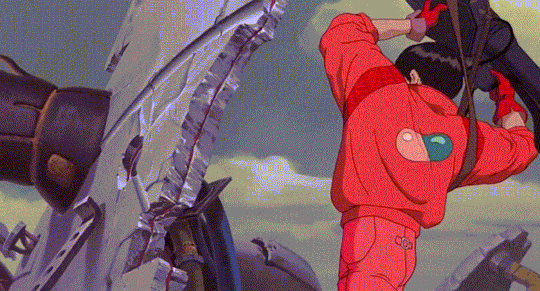
#I could've made it Kaneda's jacket it's such an iconic design#I feel like Vasco would enjoy Akira just in general now that I think about it#I should make a list of what their favorite movies would be#BUT I'm -needlessly- stubborn about their color coding#Machete shouldn't wear blue and Vasco shouldn't wear red I have my principles#answered#anonymous
436 notes
·
View notes
Text
can i confess something else that will absolutely get me stoned in the town square since im dropping my unpopular opinions. I don’t like altean broadsword Lance. i already disliked red paladin Lance. the broadsword was like rubbing salt in the wound. why couldn’t he have his own niche. why was his character development just making him keith. i understand that it was like “he accepts that he doesn’t have to be a leader and excels as a co-leader and you can find happiness that way yada yada yada”. but you could’ve done that without making him keith. also now give him something unique, cool, that falls in line with his sniper bit. i’m not saying just give him another gun, im saying give him something quiet and lethal. like a garotte. yeah i want garotte lance.
i yap a lot more in my notes by the way if you were interested in other unpopular opinions. don’t send me hate messages or comments i won’t read it and will block viciously i also will not be debating this this is my hill to die on <3
#voltron#if you wanna hate on me uh maybe don’t#i just also think everyone’s writing was lazy except allura’s by the end#i don’t go into RP/BP klance posts and hate on them so don’t come into my space i’m warning you im liberal with the block button#that’s my OPINIOOONNNNNN#voltron legendary defender#moths unpopular opinions#i hate red paladin lance and black paladin keith im not sorry#i also dislike the idea that the black paladin has a designated right hand man (figuratively)#that feels unfair in a way i can’t explain#to me#black paladin is someone that creates harmony in the group#not necessarily is the Ultimate Most Important dude#but the guy that can listen to all the noise and filter it out and come up with reasonable ideas and facilitate discussion#and make well informed snap decisions to guide the team#i don’t think there’s space for a right hand#moth speaks#lance mcclain#and i hate that shiro got side lined because they shot themselves in the foy#foot#anyways having a lion swap betrays the fundamentals of voltron we were introduced to#you can’t introduce a hard magic system and then say no thanks#like oh ok i guess it doesn’t matter if the lion chooses the paladin whatever#which by the way is my biggest issue with season one#i think it was structured badly and having allura designate lions from the get go also betrayed the principle#which you could argue for the lion swap using that argument but lance is really the only one who was without a doubt chosen by his lion#so#no#anyways#thanks for listening to me yap
95 notes
·
View notes
Note
I have no other place to yap this to so I apologise in advance.
I find it interesting in Alhaitham and Kaveh’s voicelines they tend to talk about each other A LOT in a way of complaining. Such as in Alhaitham’s Good night voiceline where he says that he’d prefer that Kaveh wouldn’t be home at all because all the chaos and noise he makes in the dead of the night. Or in Kaveh’s Good Morning voiceline where he says that he hopes that you don't run into someone who ruins your day first thing in the morning.
I guess it’s what makes other people think that they despise each other’s company. Yet they’re always viewed as a pair and Alhaitham could’ve kicked Kaveh out of the house ages ago. But what’s your opinion on that?
Hiya! there's no need to apologise, this is a safe space for all haikaveh! When I tell you your ask is scratching my brain I mean ITCHING, I have so many thoughts about this part of their dynamic so thank you for enabling me <3 This turned out to be rather long, so I hope it’s helpful to you!
The contention in both Alhaitham and Kaveh’s character stories and voice lines seems to be to create intrigue about the two as individuals, and, in turn, their relationship.


Alhaitham’s ‘good night’ voice line instantly serves as a contradiction to his character. It’s interesting, and telling, that Alhaitham, who is essentially Kaveh’s landlord, and mentions this within his fourth character story, alludes to Kaveh by using ‘roommate’ rather than ‘tenant’. ‘Landlord’ evokes a position of authority over the tenant, whereas ‘roommate’ indicates an equality between two people sharing a house – since it’s Alhaitham who advocates for the term ‘roommate’, it’s telling that, as opposed to what Kaveh believes, Alhaitham wants to establish equality between them.

In terms of what Alhaitham says in this voice line, it explicitly raises a contradiction in the form of a question: if Alhaitham is truly bothered by his roommate’s antics, why doesn’t he simply evict Kaveh?
This is relevant as this question is also posed when we initially meet Kaveh within the Archon Quest, as Kaveh states he dislikes Alhaitham’s personality, to which Alhaitham responds by saying if he bothers Kaveh so much, Kaveh always has the option to move out of the house – to which Kaveh perceives as a threat, only to then dismiss this as Alhaitham ‘changing the subject’, which seems to mean that this ‘threat’ is taken as baseless. As this isn’t called back to, this seems to be the case.


There is no real threat of eviction, and regardless of their disputes, Alhaitham ultimately gives Kaveh no ultimatum to move out. In fact, as discussed here (page 27), as we are meeting Alhaitham and Kaveh for the first time, Alhaitham allowing Kaveh to live with him contradicts his established character of living a life free of inconvenience. This instantly creates intrigue around his and Kaveh’s dynamic – who is Kaveh to Alhaitham for this exception to be made to Alhaitham’s peaceful way of life?
(An additional note of interest is that Alhaitham’s solution to the noise problem seems to be more uncomfortable than calling on Kaveh and telling him to stop his work. Alhaitham says that he’d rather not wear his noise-cancelling earpieces to bed, implying that he does so when noise is a problem at night. However, there’s no mention of Kaveh being stubborn when confronting this issue, which is why he takes to wearing his ear pieces, or any mention of confrontation at all. From this voice-line, it seems that Alhaitham avoids interaction by opting for the least comfortable option, which can be a contradiction to his character. As this is a rather brief voice-line, it’s difficult to ascertain why, but I like the idea that Kaveh is productive at night, and Alhaitham prefers not to impose on Kaveh’s work process – but this is more a headcanon than evidenced interpretation.)
Returning back to the contradiction within this voice-line, at a surface glance, this does appear to be a general complaint about Kaveh, and this can be found in Alhaitham’s lines about Kaveh, and also when discussing Tighnari. Alhaitham refers to Kaveh as ‘overly sensitive’, and ‘constantly making a fuss’.
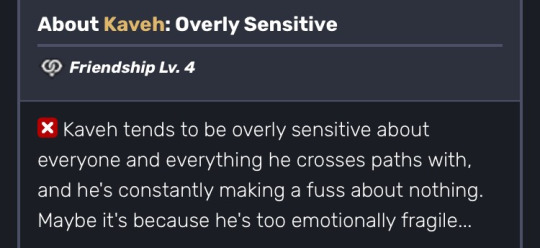
These can easily read solely as complaints, but when looking to the original CN translation, another interpretation can be found here. Alhaitham describes Kaveh as ‘caring’ or ‘tender’, which is exactly how Kaveh is described within the 3.6 special program (as per minimushiroom on twt), which can allude to how Kaveh is considerate to a fault, in that this serves as a detriment to himself.
This can be seen in Alhaitham’s other Kaveh-centred voice-line, in which he describes Kaveh buying keychains in order to provide meals for sick children, even though healthcare is free in Sumeru. Alhaitham clearly holds the view that this was a redundant action, as Kaveh, being in debt, most likely doesn’t have the money to spend on such investments that are, evidently, dubious.
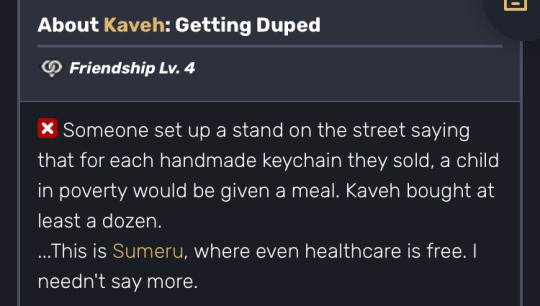
As Alhaitham provides a rational view here, this contrasts with Kaveh’s act of generosity fuelled by emotion – which highlights the contention Alhaitham has with Kaveh, in that Kaveh places himself in dangerous situations for the sake of others. However, as this can be perceived as a solely derisive line, this essential context is lacking, and can be easily misconstrued. (I think the EN translation here also coincides with this narrative, as minimushiroom notes that the original CN has Alhaitham refer to Kaveh’s sensitivity in a positive way, rather than contemptuously, as the English can be interpreted as.)
Kaveh, similarly, can be seen to complain about Alhaitham in his own voice-lines. This can be seen in the 'Good Morning' voice-line you've mentioned, where Kaveh complains about having to see Alhaitham in the morning, which 'ruins' his day. Additionally, Kaveh's voice-lines discussing Alhaitham refer to Alhaitham as ‘infuriating’ and not wanting to give Alhaitham the satisfaction of thanking him, despite Alhaitham helping him out. However, there is more nuance in these voice-lines than Kaveh simply ‘disliking’ Alhaitham, as this dislike is never stated - rather that he and Alhaitham have a difficult relationship in comparison to the ‘close’ friendship of their past.


Kaveh describes their relationship being a ‘mixed bag’, of both negatives and positives, as well as establishing a thorough understanding of Alhaitham, where other people may misinterpret Alhaitham as they ‘don’t know him well enough’. Additionally, Kaveh notes that he knows that Alhaitham can present himself in a more ‘likeable’ manner, but that Alhaitham refuses to do so, which refers to Kaveh’s contention with Alhaitham discussed within his character stories. This, in turn, generates curiosity, as it appears that Kaveh holds an in-depth knowledge of Alhaitham that the player isn’t privy to.
Referring back to Alhaitham’s ‘Good Night’ voiceline, the question raised is, if Alhaitham has a problem with Kaveh, why doesn’t he just evict Kaveh? And the answer can be found by digging further into Alhaitham’s character stories. Looking to Alhaitham’s fourth character story, it states that he is aware of the dissatisfaction Kaveh may have with their living arrangement but that ‘it matters not to him’.
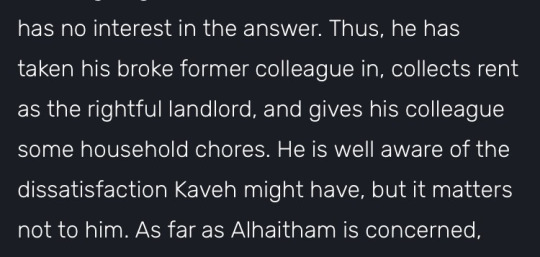
This means that he is aware that Kaveh may be unhappy with having to rely on someone else for a stable livelihood, something which his pride doesn’t naturally allow, but that this is also exacerbated due to their previous falling out and the current contentions Kaveh has with him.
At first, this can seem rather abrasive, which does fall in line with Alhaitham’s egoism as this doesn’t directly impact ‘the self’ (discussed further here), however, what immediately follows is Alhaitham’s belief that he and Kaveh are mirrors, in that his own perspective of the world will be enhanced - in the og CN, ‘completed’ -by Kaveh’s own world view.

The implication generated here with the explicit term ‘mirror’, is that, just as Alhaitham benefits from Kaveh, Kaveh, in turn, can benefit from Alhaitham. (As a side note, it is interesting then that the voice-lines in question can be seen to mirror each other – Kaveh mentions Alhaitham in ‘Good Morning’ whereas Alhaitham mentions Kaveh in ‘Good Night’.)
Returning back to Alhaitham’s character story, rather than merely reflecting each other philosophically speaking, I’d say that this also points to their respective progression as people, not just scholars.
To me, this is reminiscent of what Alhaitham says to Kaveh in A Parade of Providence – being ‘correct’, ultimately, doesn’t matter, as there is no ‘correct’ path in life, meaning that there is no ‘correct’ philosophy to shape and guide a person. Rather, Alhaitham asserts that, ultimately, their opposing philosophies are not the issue that exists between them.


The issue that does exist, then, can be surmised from Alhaitham’s actions during the event (discussed further here), in which he researches into Sachin to gauge his influence over Kaveh’s father journeying into the desert, with implicit hopes of providing closure for Kaveh, and potentially assuaging Kaveh’s guilt. This is a personal act with a personal motive; the underlying motive being concern, as opposed to an assertion of ‘correctness’.
In my opinion, I think Alhaitham’s actions during A Parade of Providence are a direct reference, and fulfilment, of Kaveh’s fifth character story. I’ve discussed here that the main reason for the ending of their friendship was them asserting the correctness of a philosophy over the other, and proposing one philosophy as the ‘solution’ to the other’s perceived flaws.
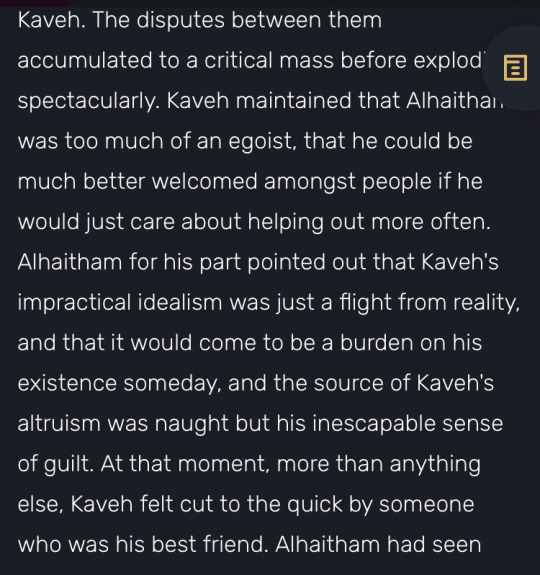

Here Alhaitham can be seen to use Kaveh’s past as the reason for his excessive altruism, implicitly referring to Kaveh’s guilt over being the supposed catalyst for his father’s demise. This final comment of Alhaitham’s appears to be the first time this has been mentioned between them, and it’s enough to be perceived as weaponisation – leading to Kaveh severing their friendship.
In A Parade of Providence, Alhaitham is shown to only have taken the role of commentator to research into Sachin, whose research we are told (by Kaveh), he has no explicit interest in, and it is heavily implied that the only reason he looked further into Sachin, was to prove to link between Sachin and Kaveh’s father. Alhaitham seems to want to absolve Kaveh of this past guilt in hopes that Kaveh will stop placing himself in the cycle of self-sabotage.
For me, when viewing this as a parallel, it highlights that Alhaitham’s motivation in speaking out during their days as students was out of concern for Kaveh, although while holding egoism as ultimately beneficial, and therefore perceivably ‘correct’. The ‘issue’ they’re currently debating is not expressly stated, and although it is unclear if Kaveh understands the implication (as discussed here), as ‘correctness’ has been overturned, there seems to be little left than the personal.
Relating this back to Alhaitham’s fourth character story, for me, Alhaitham referring to Kaveh as a mirror isn’t just referring to Kaveh as a scholar, but a person as a whole. As Alhaitham seeks to improve himself, personally, through Kaveh, it seems that he hopes to be able to benefit Kaveh in turn.
As for Kaveh’s complaints regarding Alhaitham, these can be contextualised within his own character stories. As Kaveh ultimately severed the friendship between him and Alhaitham, Alhaitham offering Kaveh to live with him, despite Kaveh revoking his previous understanding of Alhaitham (as discussed here, page 67), causes Kaveh to be overtly suspicious.
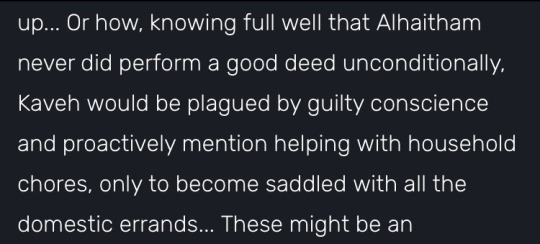
In Kaveh’s Old Sketchbook, it is mentioned that Kaveh believes there to be an ulterior motive for Alhaitham inviting him to share a house, as he believes that Alhaitham wouldn’t do something for someone else without an exchange.
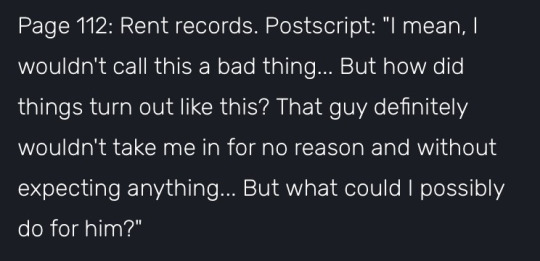
Kaveh, then, openly distrusts Alhaitham due to this unspoken motive, and although he takes on chores to ease his sense of guilt of being a perceived burden, a contention arises here. Due to their previously ended friendship, and with how Alhaitham hurt Kaveh, and how Kaveh may believe he hurt Alhaitham (discussed here), Kaveh sees no reason for Alhaitham to want him around – he treats their relationship as an exchange, asking what Alhaitham could possibly want for him.
Although Alhaitham views Kaveh as a mirror, and therefore, respects Kaveh’s perspectives, Kaveh can potentially view their opposing philosophies as a negative rather than a positive as he had done in the past (as discussed here), as it, perceivably, was what led to the end of their friendship. In this, Kaveh views Alhaitham as disparaging him and his views. As mentioned in his character story, he has no reservations in telling Alhaitham of his debt as Alhaitham has already seen through him in the past, and yet again, upon meeting at the tavern.
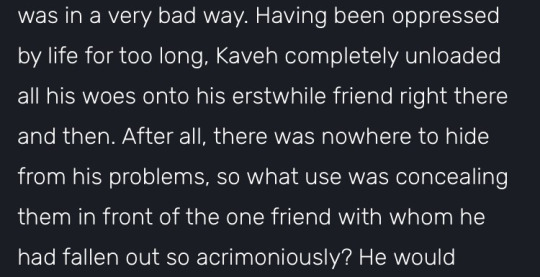
Although Alhaitham perceivably views him unfavourably, and his comments and complaints appear to propagate this interpretation, Alhaitham also seems to have no issue with keeping Kaveh around, and interacting with Kaveh, regardless of the problems Kaveh expressly has with him.
To Kaveh, it could be that as Alhaitham has already seen the worst of him, and appears to have no real issue with their stilted rapport, there is no point in donning a front and using niceties. He is open with his issues with Alhaitham, and, in turn, Alhaitham is open with him.
This appears to be a dual negative and positive for Kaveh, as he describes Alhaitham’s constancy as ‘the most unshakable part of one's past is a friend that will never change’. In this sense, his unsteady rapport with Alhaitham is reliable, and therefore, has no reason to change.

Clearly, there is a large disconnect between Alhaitham’s view of Kaveh and how Kaveh perceives Alhaitham’s view of him. As previously mentioned in the discussion of A Parade of Providence, there is an unspoken ‘issue’ between them, and this can be interpreted as dire misconceptions borne from miscommunication.
As discussed, Kaveh and Alhaitham reference each other a lot in their respective voice-lines and their character stories. This alone is enough to connect them, regardless of the cruciality of their mirror motif, as they are key figures of each other’s past, present, and seemingly, future. Despite this, it’s as you say, there’s a common perception to view them as mutually disliking each other, and, to me, this is based upon their first initial interaction, and the way they refer to each other in their own character stories and voice-lines.
It’s notable that Alhaitham refers to Kaveh in his voice-lines when Kaveh is not explicitly relevant, such as in his Good Night voice-line, and, most interestingly, when Alhaitham discusses Tighnari.

This could be because Alhaitham knows of Tighnari through Kaveh, but as this connection isn’t stated, it reads as Alhaitham mentioning Kaveh for no other reason than to complain about his perceived naivety regarding relations with others. But as this is a voice-line designated to discussing Tighnari, it’s interesting, and incredibly noticeable, that Alhaitham then discusses Kaveh instead. It’s similar to what Kaveh can be seen to do, and is observed to do by others, in relation to discussing Alhaitham.

When it comes to Kaveh, however, his complaining of Alhaitham can be seen to link with his process of dealing with troubles in his work. In his Hangout, he states that he takes his work to heart because he cares about it, which is expressed in the same quest in which Kaveh and the Traveller run into Alhaitham in the House of Daena (discussed further here, page 219).
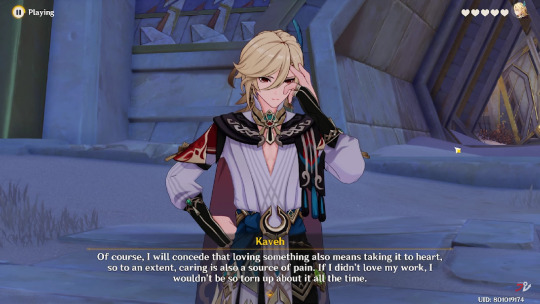
Drawing a parallel here can further contextualise Kaveh’s complaining of Alhaitham – if Kaveh truly disliked Alhaitham, there seems to be no reason for Alhaitham to remain so relevant to him, both in conversation, and in private thought. Additionally, Kaveh is described as an empathetic person, and when dealing with others, he is thusly seen to look for another perspective rather than act on his own subjective perspective.
Looking at his voice-line on Dori, for example, expresses his distaste for Dori pressuring him for Mora due to his debt, however, he also empathises with her, and states that he senses there must be a reason why Dori acts in such a way.

In contrast, this empathy can be perceived as missing in his treatment of Alhaitham, and therefore Kaveh complaining about Alhaitham can be perceived as blatant dislike – which contradicts Kaveh’s benevolence and empathy, which A Parade of Providence particularly stresses.
Kaveh’s treatment of Alhaitham can be seen as deliberately contradictory, as it can cause the player to question why Kaveh reacts in such a singular way to Alhaitham, just as why Alhaitham reacts in a singular way to Kaveh.
In reference to Alhaitham, whilst Alhaitham tends to complain about Kaveh in turn, his actions reveal him. He invites Kaveh to live with him, gives no eviction date, pays for Kaveh’s tabs willingly, (supposedly) buys wine as an apology, and goes out of his way to ensure dialogue with Kaveh – which contradicts his own character stories, in which he appears to favour solitude, and only greets those he considers his friends ‘with a nod or two’.

Moreover, Alhaitham is established as considering Kaveh a necessity to his ‘peaceful life’ he seeks to maintain (as discussed here), and can be seen to implicitly consider Kaveh one of his priorities within his Story Quest.
The idea that Alhaitham dislikes Kaveh seems to stem from Alhaitham being taken literally when voicing an opinion, or an issue, or simply joking, in reference to Kaveh – despite his character stories highlighting that Alhaitham often uses sarcasm in order to subvert expectations.

Alhaitham expressly states that he prefers to be seen as inscrutable, and unknown, by the general public, and uses subversion as a means to do so. In these character stories, Alhaitham openly encourages speculation of his own words.
Without this context, it seems easy to simplify Alhaitham to purely speaking factually when first addressing Kaveh in the Archon Quest – stating that having to explain things to Kaveh is ‘a nuisance’, and yet, it is overlooked that Alhaitham stays in the House of Daena, regardless, knowing Kaveh would find him again.
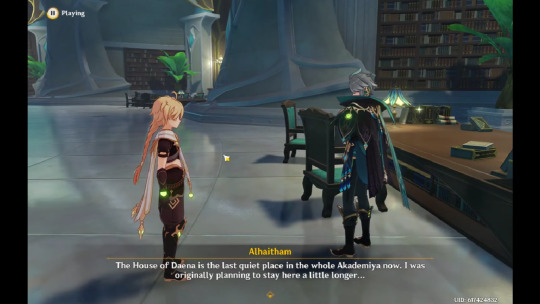
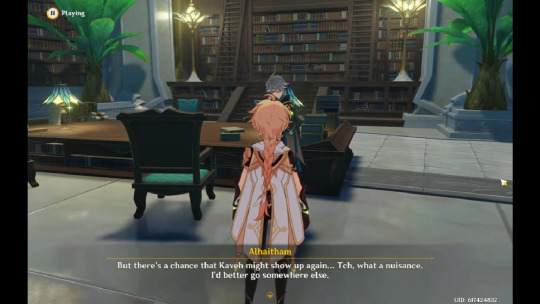
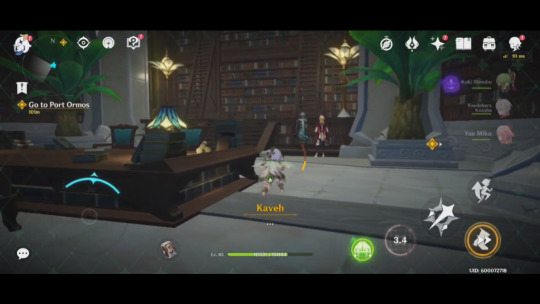
On the whole, in my opinion, Kaveh’s feelings towards Alhaitham cannot be simplified to ‘dislike’ as this is dually an inherent misunderstanding of his character, and of his and Alhaitham’s relationship, just as Alhaitham’s feelings towards Kaveh cannot be simplified to ‘dislike’ for this same reason.
In the beginning, Alhaitham and Kaveh are not supposed to be perceived as friendly, as Kaveh denies the association of ‘friends’, and Paimon describes them to the Traveller as ‘problematic’.

The reason for this is due to their character arcs being intertwined – the core issue is posed in Kaveh’s fifth character story, in that the question is raised if a compromise can be reached, if both sides of the mirror, can be balanced. At the beginning, they are entirely at odds, but even footing must be found.
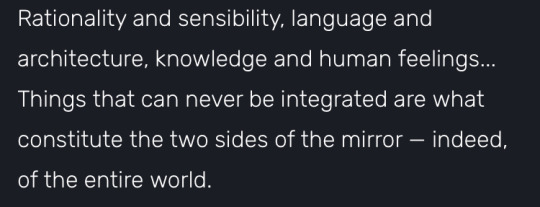
I’ve noticed a shift in online discourse after Cyno’s second story quest, as the progression in Alhaitham and Kaveh’s relationship is noticeable – deliberately, due to the flashback scene within their house (which I’ve discussed in detail here, page 122). To me, it’s more common to form the assumption that Alhaitham and Kaveh dislike each other in the Archon Quest, but with recent developments, and, hopefully, future ones, this perception is being overturned in online communities. Perhaps that’s just wishful thinking, but I’m still hopeful!
#haikaveh#kavetham#alhaitham#kaveh#genshin impact#thank you so much for your ask anon! it really ate away at my brain#haikaveh's writing is just so !?!?!? theres so many layers to peel back so a surface read of their relationship can be misconstrued as toxi#but ultimately i think these voice lines and details of their character stories are for people to question WHY they are Like That with#each other and it's one of the things i love about them that nothing is upfront or simple it really suits their themes so well#alhaitham constantly questions the world around him and flips language on its head and kaveh challenges the world with his ideals but works#with rigid principles of design and construction and he can't tell sarcasm from genuine praise which also adds to why he takes alhaitham's#words so personally... but this is improving now?? i am saying thank you cyno's second story quest <333#also the narrative that haikaveh can't stand each other seems to be more of a western thing from what i've seen online#and i think this is possibly due to the EN translation where the CN is less derisive or abrasive?#thank you to those who translate so the nuance is pointed out! <3
117 notes
·
View notes
Text


i think they'd be very silly about it
#good omens#i love my book designs dearly#nsftext#aziracrow#aziraphale#crowley#aziraphale good omens#crowley good omens#gomens#ineffable husbands#art#my art#everyone ignore that the decriminalisation of gay sex would have very little to do with them cause of their whole gender debacle#i think aziraphale is mostly bothered by the principle (lol) of the thing#book omens
694 notes
·
View notes
Text

this pic is frying me so bad LOL 😭😭😭😭😭😭😭
#this is vee speaking#was reviewing the bb vs dh battle in the manga for sumn and saw the way that artist drew sasara getting serious#and shortly after this post popped up on my feed lmao if there’s one thing that i simp over about sasara#it is his eyes lol he happens to have my fav eye shape design#these visuals tho LOL#how intimidating is sasara like RLY????#ik i personally have found him a little intimidating in his mcd days (specifically in the tdd manga lol)#but the story doesn’t really present sasara as a scary individual the way it has with rosho and rei#but i kinda?????? wanna say all three have been shown as intense when their eyes aren’t obscured#it’s why sasara told rosho to wear glasses lol#and i still get shivers thinking of that glare rei levelled at otome after repeating that he’s minding his own shit lol#sasara with his eyes open ig on the principle of it him being serious has the same effect huh?????#like maybe he’s not scary but you’d find yourself thinking his eyes are intense when open#eyes open sasara no glasses rosho and a pissed off rei with no shades are walking down the street towards you wyd LOL
24 notes
·
View notes
Text
yeah hi excuse me @staff / @humans-

absolutely not
absolutely fucking not

idk if i have the clearance to say "on behalf of everyone" but this ain't it and i shouldn't even have to be the one to tell you that
#i guarantee you there is zero design philosophy behind this#it in no way 'improves tumblr' or cares about the 'user experience#it is not a 'fix'#there is are no principles or deeper 'core strategies' here#it's literally just 'lol let's copy that app we know all our users hate'#like did they think we liked twitter before it got bought out by musk ???#tumblr#tumblr update#tumblr staff#staff
384 notes
·
View notes
Text

just like how freddric can use viridian's bow, i'd like to think he picked up the flute for chartreuse
#guy who isn't into x/b3 in the slightest learns what song chartreuse plays when you use her in battle and is very normal about the context#fire emblem: the morrow's golden country is a 45+ hour long advertisement for xnoblade 3 and you know what it's kind of working#real glad people have sent me the designs/description for deadlord fred bc let me tell you i am Never getting that on my runs#2/3 of my slots will consistently be spoken for bc i refuse to let rose die on principle too oops OTL#anyway... thinking abt how it's always been viridian fred and chartreuse... fred can't even remember how long ago they all met#and now he has to live without both of them. and carry on both their dreams on top of everything else#thumbs up. and he'll live even when he feels like he can't and is so normal about it!#sketch#fire emblem#fe tag#fe tmgc#tmgc#the morrow's golden country#fe tmgc spoilers#freddric roryns#chartreuse (tmgc)#viridian arvalens
15 notes
·
View notes
Text
this is fully a me issue but my thing with video games is if i don't understand the controls within 2 minutes of starting the game im quitting. and i don't care how good the story or graphics or gameplay or whatever is. i'll give it one (1) good ol' college try, and after 2 mins i will look in the options to see if i can look at the button mapping, and if i do not understand it immediately i am moving on. there are literally thousands of games that can accomplish the very simple task of telling me what buttons control what actions that i do not believe in "figuring out" the controls. frankly im at the point where if the menu is too annoying to navigate im quitting. once i quit a game because the [!] markers didnt go away when i went to that inventory tab. i do not believe in sticking it out for video games. video games are for fun leisure time and sticking it out is a resource i reserve for shit that actually matters. video games have exactly one (1) shot to immerse me in the game and if literally any aspect of the game prevents that im ditching it forever #realwinnersquit
#good idea generator#on principle also im mad as fuck if youre not even allowed to look at the button mapping#i think you should be able to remap buttons for every game but i understand that this can pose design problems#but not even letting me SEE what buttons do what???? evil. evil evil evil fuck you and fuck your game forever#note that im not really talking abt the mechanics themselves. just how those mechanics are communicated to the player#like. a game can be very difficult and grindy and require a LOT of time to succeed and still tell you the controls
11 notes
·
View notes
Text






Forgot a tablet component once again yesterday so I doodled, of course
#bigeloo's scribbles#if you haven't guessed I have gotten very normal™ about samurai jack#I find the artstyle delightful and I hope I manage to absorb it successfully one day#but for now I doodled jack's face (and body in a doodle I'm not posting) from several references to get it right#and then tried to apply those style principles to Mar and Seth#samurai jack#oc art#angel oc#mar angel#mar#seth principality#seth#critter#sona art#anyways Jack always struck me as a kitty cat#I know he was turned into a rooster in that one episode but that was by an evil wizard who turned *everyone* into chickens so I'm taking it-#as a not true reflection of him#though I very much enjoyed that design of his as a bird enthusiast#one last note: I think if Jack was a cat he would resemble an oriental shorthair with the long face and all
7 notes
·
View notes
Text



#;ooc#ooc#venchu staring off the distance-#i dont have high graphics but even then u can get the vibes-#god i love p.enacony so much; it gives me such aura- the vibes are SO good; impecable#the music too; its so relaxing;; luxurious-#i think s.tar r.ail peaked so much with it; like the next part must be really REALLY good in order to top it for me#i love when 'arcs'/areas in game have these very distinctive aesthetics/vibes in the sense of;;#where u could follow the design principles and come up with something coherent that perfectly fits the place#which is what i feel like n.atlan in g.enshin kind of missed#and why a lot of the characters look completely separated from n.atlan#like you can get a feeling when u see charas like l.yney; l.ynette; f.urina; n.euvi that they come from the same time and area#they follow such a clean cohesion that even when their designs are distinguishable and different from each other ; you can get the vibe sti#which btw im always up for things that fall out of the box; bc things arent always so rigid and 'fitting'#but i dunno;; n.atlan was such an all over the place area still; that the differences didnt feel enriching and engaging#and this isnt about the usual yadayada about m.avuika's motorcycle like im done with seeing that argument#i mean the -general- lineup; including looks/personalities/kits; all#anyways whatever what do i even know#bc even if n.atlan wasnt my cup of tea; maybe to someone else its their fav region u see#like how sometimes i dont vibe with n.asu's stuff; but other people do; thats just how tastes are#;delete later#dl#i dont tend to vibe with those strict unwavering labels that sometimes people impose; sometimes they can be very restrictive creative wise#but in my experience; having a -base- root/concept can help the inmersion and meaning behind things a lot#and it becomes an overall more memorable thing#like from knowing that base; you can expand and branch out and still make it feel engaging and new and different
7 notes
·
View notes
Text
.
#every time I hear a medieval scholar talk about the medievals' understanding of magic I get a massive ego boost#because when worldbuilding Hollowick I asked myself the question#'if God built magic into the world what would be sin and what wouldn't?'#and the result was to unknowingly recreate the medieval understanding of magic#which makes me think that maybe the difference between the Hollowick timeline and our timeline is the Enlightenment#and maybe the reason they didn't have the Enlightenment is because magic is a real component in their world#that can't ultimately be reduced down to scientific principles (no matter how hard the magicians try)#ugggghhhhhhh this is why I love writingggggg#I also keep finding that the 3 sinful magics I designated show up symbolically EVERYWHERE in the story#without my deliberately putting them there#the more I zone in on the magic 'system' the more thrilled I am with the story#and the more I fear blowing it#x#writing#Hollowick
12 notes
·
View notes
Text
You know... it's okay to trust your body. If you are separated from your body to such an extent you feel you cannot trust it, I truly from the bottom of my heart empathize and feel grief for you, but you can trust your body.
It's okay to listen to your body and to heed what it is telling you. I wish you (and your body) well wherever you go. You deserve the peace of mind to feel able to do what you want.
#positivity#mental health#mental health support#gentle reminders#this is something i struggle with myself so that's why i said i empathize (well... i guess as much as you CAN empathize)#(because even if you have gone through the same thing... it's not going to look the same as somebody else going through that)#(and while it can be valuable to express empathy it doesn't mean you truly 'get it' from the other person's point of view)#i struggle sometimes not to feel like my body is fucking with me because sometimes i expect it to function at bare minimum#or i just assume that when it is in debilitating pain that it's just... somehow to fuck with me and i am cognizant that this isn't true#i am cognitively aware that the body isn't Specifically Designed to have a Fuck With You mode even if it feels like it#but my experiences with disabilities and general unwellness made it easy for me to alienate myself from my body#in order to preserve myself i felt the need to separate myself from every flaw (or 'flaw') i have#so when people are confused about why you could mistrust your /own body/ it's stuff like this that can somewhat illustrate it#i think we don't really talk about this but i think it's more common than i would assume#(mostly based on the There Are Eight Billion People principle)#hm making this also makes me realize that abuse absolutely plays into how i mistrust my body. hm.#mistrust in your body feels like self-protection and self-preservation in this weird and almost twisted way (at least in my experience)#but then you start mistrusting *everything* and nothing feels... GOOD or NORMAL anymore#i'm going to play mahjong about this 🫡👍
137 notes
·
View notes